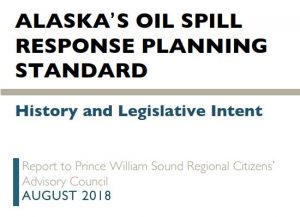The recent public scoping notice issued by the Alaska Department of Environmental Conservation, along with statements made by the department’s commissioner, Jason Brune, have caused concern at the Council.
Some of the commissioner’s statements were interpreted as encouraging a reduction in regulations, safeguards that could lead to a return to the complacency that led to the 1989 Exxon Valdez oil spill.
References to “burdensome” regulations
Last March, the commissioner spoke to Alaska’s Resource Development Council, an organization comprised of representatives from Alaska’s oil and gas, mining, timber, tourism, and fisheries industries. He told the group that he has been focusing on the word “economic” in the department’s mission: ‘Conserving, improving, and protecting Alaska’s natural resources and environment to enhance the health, safety, economic, and social well-being of Alaskans.’ He specifically requested comments from members of the business group regarding which regulations they view as “overly onerous” and “unnecessary.” “We need to make sure that we hear from you what we can do to help make Alaska open for business,” Brune told them.
